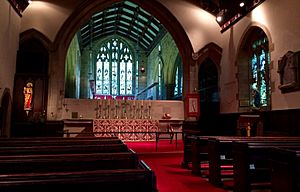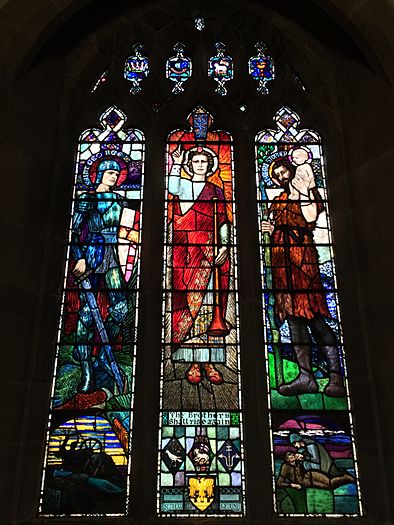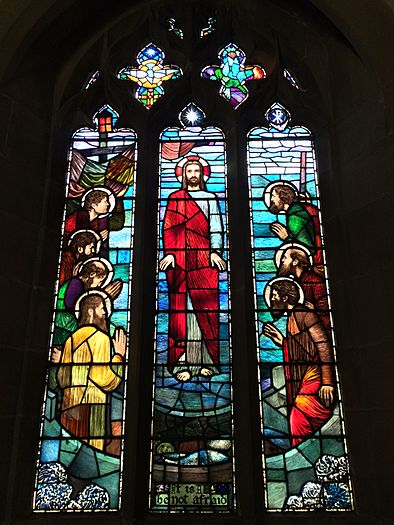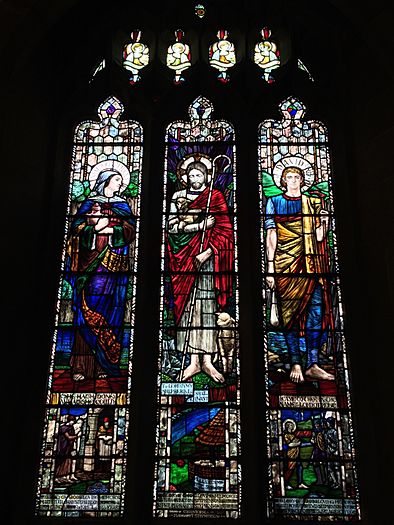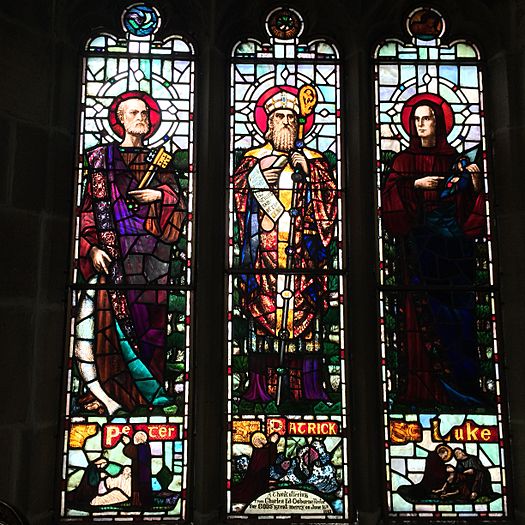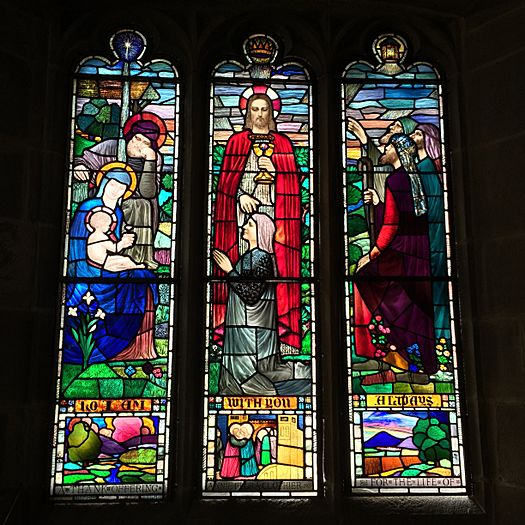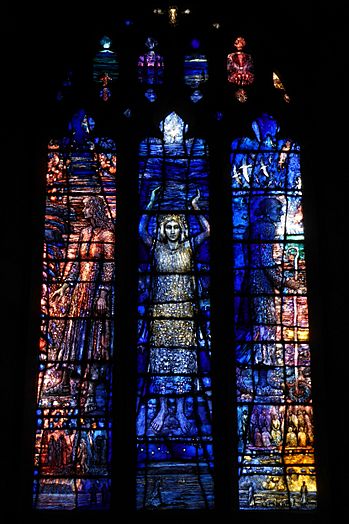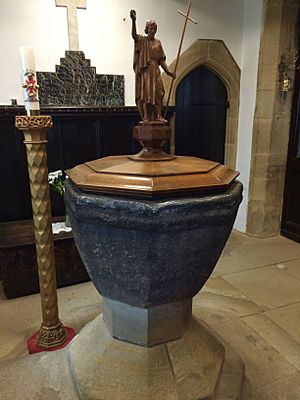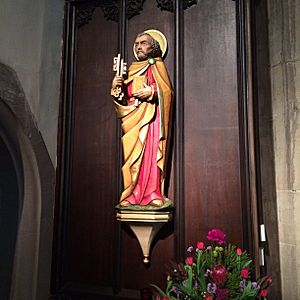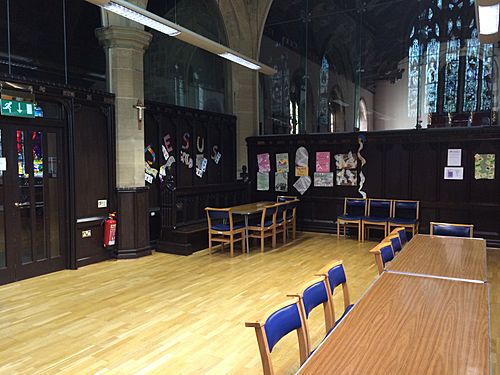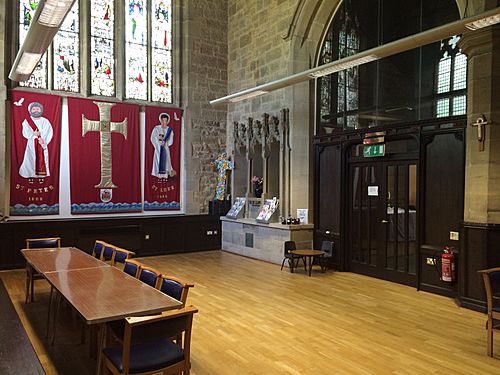St Peter's Church, Wallsend facts for kids
Quick facts for kids St Peter's Wallsend |
|
|---|---|
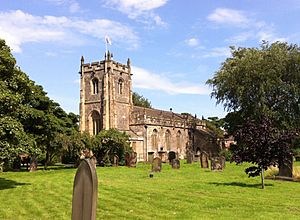 |
|
| 54°59′38″N 1°31′03″W / 54.9940°N 1.5176°W | |
| Location | Church Bank, Wallsend |
| Country | England |
| Denomination | Church of England |
| Churchmanship | Anglo-Catholic |
| History | |
| Founded | 1809 |
| Dedication | St Peter |
| Administration | |
| Parish | Wallsend St Peter and St Luke |
| Deanery | Tynemouth |
| Archdeaconry | Northumberland |
| Diocese | Newcastle |
| Province | York |
The Church of St Peter is an old and important Church of England church in Wallsend, North Tyneside. It's a special building, listed as Grade II*, which means it's historically very important. This church was built to replace an even older one, Holy Cross Church, which was built around 1150 but became very run-down by the late 1700s. St Peter's Church was changed a lot in 1892 to look mostly like it does today. It is the oldest church in Wallsend.
Contents
The Church's Story
Why a New Church Was Needed
By the 1790s, the old Holy Cross Church was falling apart. Its roof was gone, and it couldn't be used for services anymore. People in Wallsend had to go to the local schoolroom for church services instead. Everyone agreed that a new church was needed.
How the Church Was Funded
Building a new church was slow because people disagreed about who should pay for it. This problem lasted until 1804. A lawyer came up with a clever idea: a tontine. This was a special way to raise money where people invested, and those who lived longest got more money back. This unusual plan worked, and the church got the money it needed.
Building the Church and Later Changes
Work on the new church didn't start until 1806. It was then discovered that the schoolroom being used for services wasn't officially approved. This meant that marriages held there might not be legal. To fix this, a special law was passed in 1807 to make the marriages legal and allow the new church to be built.
The first stone of the new church was laid in November 1807. The churchyard, where people are buried, was officially blessed in 1809. The church was greatly changed in 1892 to give it the look it has today.
Saving the Church from Closure
By the 1980s, parts of the church, especially the Victorian chancel (the area near the altar), had serious problems. There was a worry that the church might have to close. But from 1995 to 2001, a priest named Fr Alan Clements helped get big grants from English Heritage and the Heritage Lottery Fund.
These grants helped fix the church's foundations and make all the needed repairs. The project also changed the chancel into a church hall, the Lady Chapel into a room for priests' robes, and the old changing rooms into a kitchen and restrooms. In 2001, St Peter's joined with St Luke's Church to form one larger parish.
Church Traditions
The Oxford Movement's Influence
In the early 1800s, during the time of Fr Armstrong, new ideas from the Oxford Movement began to influence the church. This movement focused on older church traditions and ceremonies. Some people in the church didn't like these changes at first. Fr Armstrong was even accused of caring more about ceremonies than about faith. But his strong efforts over 40 years set the stage for future leaders. St Peter's Church still follows these traditions today, known as Anglo-Catholicism.
Beautiful Stained Glass
One of the most special things about St Peter's Church is its amazing collection of colourful stained glass windows. These windows were made by artists from the Tower of Glass movement in the early 1900s.
- An Túr Gloine (Tower of Glass) Windows in St Peter's
In 2017, artist Thomas Denny created and installed a new window called 'Stella Maris' (which means 'Star of the Sea'). This window was a special thank you for the church's 200th birthday in 2009. It was paid for entirely by donations and fundraising.
Other Interesting Features
The Ancient Font
The font, which is used for baptisms, is very old. It originally came from Holy Cross Church. Monks from Jarrow would have used it to baptise babies in Wallsend centuries ago. After Holy Cross Church was no longer used, the font ended up in Wallsend Burn, a local stream. It was rescued in the 1800s and eventually given to St Peter's Church in 1891.
The Pipe Organ and St Peter Statue
The church has a pipe organ made by Harrison & Harrison in 1892. There is also a statue of St Peter the Apostle, located near the main altar. This statue was specially ordered by a former priest, Fr Peter Strange.
Stocks and Memorials
Outside the church, you can see a set of old stocks. These were once used to punish people who broke rules, like not going to church on Sundays. Today, they are sometimes used for fun wedding photos!
In the churchyard, there are unmarked graves of many people who died in mining disasters. Special plaques remember those lost in the Heaton Main Colliery Disaster of 1815 and the Wallsend Colliery Disaster of 1835.
The Nonsuch Chest
The church also has a very old chest. Experts on the Antiques Roadshow identified it as a "Nonsuch chest" from the 1580s. It's decorated with copies of plans from Nonsuch Palace, a palace built by King Henry VIII that no longer exists. Only a few of these chests are known to exist.
Church Leaders
For a long time, monks from St Paul's, Jarrow, helped lead the church in Wallsend. After a period called the Reformation, the church leader was known as a "perpetual curate." Since 1856, the leader has been called a "rector." Today, the leader of the combined Wallsend St Peter and St Luke parish is also a rector.
Some Past Rectors
- 1856-1871 John Armstrong
- 1906-1936 Charles Osborne
- 1944-1969 Cecil Davis
- 2002-2011 Michael Vine
- 2012-2019 David Sudron
Today at St Peter's
The part of the church that used to be the chancel is now a church hall. It's used for social events and can be rented by local groups.
 | Sharif Bey |
 | Hale Woodruff |
 | Richmond Barthé |
 | Purvis Young |


